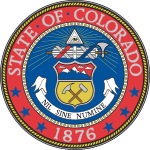| |||||||||||||||||||
61 delegates to the Democratic National Convention (51 pledged, 10 unpledged) The number of pledged delegates received is determined by the popular vote | |||||||||||||||||||
|---|---|---|---|---|---|---|---|---|---|---|---|---|---|---|---|---|---|---|---|
| |||||||||||||||||||
 Primary results by county Gore: 35–40% 50–55% 55–60% 60–65% 65–70% 70–75% 75–80% 80–85% 85–90% | |||||||||||||||||||
| Elections in Colorado |
|---|
 |
| Pledged national convention delegates | |
|---|---|
| Type | Del. |
| CD1 | 6 |
| CD2 | 6 |
| CD3 | 6 |
| CD4 | 5 |
| CD5 | 5 |
| CD6 | 5 |
| PLEO | 7 |
| At-large | 11 |
| Total pledged delegates | 51 |
The 2000 Colorado Democratic presidential primary took place on March 10, 2000, as one of two contests scheduled on the weekend following Super Tuesday in the Democratic Party primaries for the 2000 presidential election, following the South Carolina caucuses the day before. The Colorado primary, the first in the state since 2000, was a semi-closed primary and awarded 61 delegates towards the 2000 Democratic National Convention, of which 51 were pledged delegates allocated on the basis of the results of the primary.
Vice president Al Gore won the primary with 71% of the vote and ultimately received 44 delegates, ahead of Senator Bill Bradley, who won roughly 23% and received 7 delegates, after withdrawing the night before.[1] The option for Uncommitted received 4% of the vote and conspiracy theorist Lyndon LaRouche Jr. received just under 1%.[2]
- ^ "Bush, Gore Clinch Nominations". March 15, 2000. Retrieved September 13, 2023.
- ^ "Colorado Democratic Delegation 2000". The Green Papers. December 23, 2000. Retrieved September 15, 2023.

